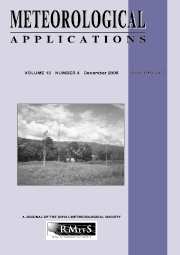Article contents
Estimation of road salt use based on winter air temperature
Published online by Cambridge University Press: 11 September 2001
Abstract
The annual amount of salt used to prevent slippery conditions on roads was estimated with the help of winter monthly mean air temperatures. Air temperature is measured reliably at almost all meteorological stations and the use of air temperature for the estimation of road maintenance conditions is a tempting alternative compared with the use of more complicated indices calculated using meteorological observations available at only a small number of stations. It was found that in Finnish climatological conditions, warmer than normal weather in November and March and colder than normal weather in December, January and February reduces the need for salting. Warm mid-winter months mean slippery conditions and, consequently, an abundant use of salt. The temperature explained about 60% of the annual variation of salt use and thus gave surprisingly good estimates for the salting amounts.
Information
- Type
- Research Article
- Information
- Copyright
- © Royal Meteorological Society
- 9
- Cited by

